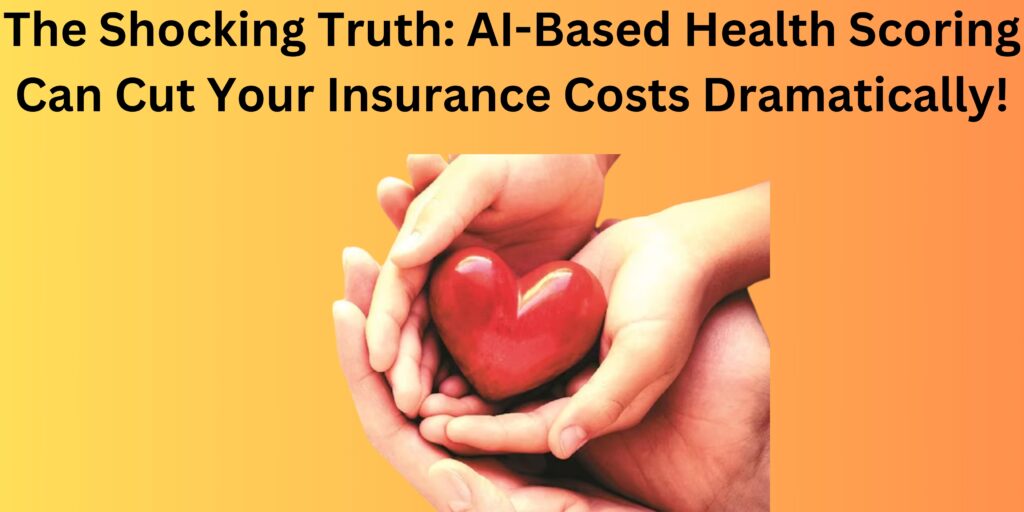Imagine paying significantly lower insurance premiums simply by letting artificial intelligence analyze your health data. Sounds too good to be true? Well, AI-based health scoring is already transforming the insurance industry, helping individuals secure better deals while encouraging healthier lifestyles. This cutting-edge technology is not just a trend—it’s a revolution that your insurance provider might not want you to know about.

In this article, we’ll uncover how AI-driven health scoring works, why it benefits policyholders, and how you can leverage it to cut down your insurance costs dramatically.
The Traditional Insurance Model: Why It’s Flawed
For decades, life and health insurance premiums have been determined by outdated methods, including:
- Static Health Assessments – A one-time medical exam and questionnaire determine your premium, often failing to reflect changes in your health over time.
- Broad Risk Categorisation—Insurers lump people into generalized risk groups, meaning healthier individuals often pay higher premiums than they should.
- Limited Incentives for Healthy Living – Even if you maintain an active lifestyle, insurers rarely adjust your premiums accordingly.
- Complex Underwriting Process – The traditional model involves lengthy paperwork and medical evaluations, delaying approvals and policy adjustments.
But what if your insurance premium was based on your actual, real-time health data instead of outdated risk models? That’s exactly what AI-based health scoring aims to achieve.
Read more:
What is AI-Based Health Scoring?
AI-based health scoring uses machine learning algorithms and big data to assess an individual’s health risk dynamically. This system analyzes real-time health data collected from multiple sources, including:
- Wearable devices (Fitbit, Apple Watch, Garmin)
- Health apps tracking diet, sleep, and activity
- Electronic medical records (doctor visits, prescriptions, lab results)
- Genetic testing and predictive analytics
By continuously analyzing these data points, AI can create a realistic and up-to-date health profile, allowing insurers to provide personalized premiums that truly reflect your health status.
How AI-Based Health Scoring Reduces Insurance Costs
1. Personalized Premiums Based on Real-Time Data
Instead of basing your insurance costs on a one-time exam, AI-driven health scoring adjusts pricing dynamically, rewarding you for maintaining a healthy lifestyle.
How This Works
- AI analyzes your activity levels, sleep quality, and vital signs.
- If you maintain good health, your risk score improves, leading to lower premiums.
- The system continuously updates your score, ensuring fair pricing at all times.
Example
Vitality Health offers reduced premiums for individuals who meet step count goals and maintain a healthy diet.
2. AI-Driven Risk Assessment for Fair Pricing
Traditional insurers generalize risk, but AI uses individualized risk assessment to ensure fair pricing.
Why This Matters
- Eliminates bias in pricing—your premiums are based on actual data, not assumptions.
- Encourages early detection of health risks, allowing for preventive care.
- AI identifies false claims and fraud, reducing unnecessary costs.
Example
Lemonade Life uses AI-powered risk assessment to offer instant policies with transparent pricing.
3. Rewards and Incentives for Healthy Living
Many AI-driven insurers gamify health tracking, offering rewards such as:
- Lower premiums for meeting health goals
- Cash-back incentives for staying active
- Discounts on gym memberships and wellness products
Why This Matters
- Motivates users to adopt healthier habits.
- Creates a win-win scenario where both insurers and customers benefit.
- Makes health insurance more engaging and personalized.
Example
AIA Vitality provides airline miles, discounts, and premium reductions to customers who engage in healthy behaviors.
4. Faster and Hassle-Free Insurance Approvals
With AI analyzing your health data in real-time, insurers can:
- Offer instant policy approvals without medical exams.
- Adjust policies dynamically without lengthy paperwork.
- Process claims faster using automated verification.
Example
Bajaj Allianz’s AI-integrated system allows policyholders to get insured without a medical exam, using only health app data.
5. Fraud Prevention and Transparent Claims Processing
Insurance fraud is a major issue, often leading to higher costs for honest policyholders. AI-based health scoring reduces fraudulent claims by:
- Cross-referencing health data with medical records.
- Detecting inconsistencies in reported health conditions.
- Using blockchain technology for secure data storage and verification.
Why This Matters
- Honest customers benefit from lower premiums.
- Faster claims processing reduces delays and disputes.
- Transparency ensures fair treatment for all policyholders.
Example
MetLife’s AI-powered fraud detection system has reduced false claims by up to 40%.
The Future of AI-Based Health Scoring in Insurance
With AI-driven health scoring, the insurance industry is moving towards a data-driven, fair, and cost-effective model. Here’s what we can expect:
- More insurers adopting AI-based underwriting.
- Greater personalization, making policies fairer for individuals.
- Better integration with digital health tools, allowing seamless data tracking.
- More transparent and automated claims processing.
FAQs
AI analyzes real-time health data from wearables, apps, and medical records to calculate a dynamic risk score that determines your premium.
Not necessarily. Many insurers use app-based tracking and telemedicine consultations for health assessments.
Yes! Most companies use secure encryption and blockchain technology to protect user data.
Yes! Many insurers offer hybrid plans, allowing you to integrate digital health tracking into existing policies.
Yes! Companies like Bajaj Allianz, ICICI Lombard, and Acko are incorporating AI-driven health scoring in their policies.
Conclusion
AI-based health scoring is revolutionizing life and health insurance, making premiums more affordable, fair, and personalized. By using real-time data, AI-driven risk assessment, reward-based incentives, and fraud prevention, these smart insurance models empower policyholders to take charge of their health while enjoying lower costs.
If you’re still stuck with a traditional insurance policy, it might be time to explore AI-driven alternatives—because paying high premiums for outdated risk assessments is a thing of the past!
So, are you ready to embrace the future of insurance and start saving today?